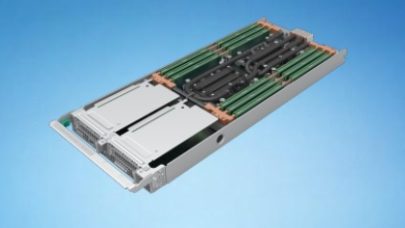
Facebook Parent Meta’s New AI Supercomputer Will Be ‘World’s Fastest’
January 24, 2022
Fresh off its rebrand last October, Meta (née Facebook) is putting muscle behind its vision of a metaversal future with a massive new AI supercomputer called the AI Research SuperCluster (RSC). Meta says that RSC will be used to help build new AI models, develop augmented reality tools, seamlessly analyze multimedia data and more. The supercomputer’s... Read more…

AMD’s Massive COVID-19 HPC Fund Adds 18 Institutions, 5 Petaflops of Power
September 14, 2020
Almost exactly five months ago, AMD announced its COVID-19 HPC Fund, an ongoing flow of resources and equipment to research institutions studying COVID-19 that began with an initial donation of $15 million. In June, AMD announced major equipment donations to several major institutions. Now, AMD is making its third major COVID-19 HPC Fund... Read more…

Penguin Computing Brings Cascade Lake-AP to OCP Form Factor
July 7, 2020
Penguin Computing, a subsidiary of SMART Global Holdings, Inc., announced yesterday (July 6) a new Tundra server, Tundra AP, that is the first to implement the Read more…

AI and Enterprise Datacenters Boost HPC Server Revenues Past Expectations – Hyperion
April 9, 2019
Building on the big year of 2017 and spurred in part by the convergence of AI and HPC, global revenue for high performance servers jumped 15.6 percent last year Read more…

Penguin Computing Launches Consultancy for Piecing AI Strategies Together
October 18, 2018
AI stands before the HPC industry as a beacon of great expectations, yet market research repeatedly shows that AI adoption is commonly stuck in the talking phas Read more…

Penguin Computing in $85 Million Acquisition Deal
June 12, 2018
If another indication were needed of the explosive growth in cloud services, AI-based workloads and Linux in the enterprise - along with their attractiveness to Read more…

Penguin Takes a Run at the Big Cloud Providers
April 12, 2017
HPC specialist Penguin Computing recently re-ran benchmarks from a study of its larger brethren and says the results show its ‘public cloud’ – Penguin on Demand (POD) – is among the leaders in cost and performance. Read more…

Penguin Computing Mines Commodity Gold
January 6, 2016
We recently sat down with Fremont, Calif.-based Penguin Computing to learn about the Linux cluster specialist’s unique approach to the HPC and hyperscale mark Read more…

- Click Here for More Headlines

Whitepaper
Transforming Industrial and Automotive Manufacturing
In this era, expansion in digital infrastructure capacity is inevitable. Parallel to this, climate change consciousness is also rising, making sustainability a mandatory part of the organization’s functioning. As computing workloads such as AI and HPC continue to surge, so does the energy consumption, posing environmental woes. IT departments within organizations have a crucial role in combating this challenge. They can significantly drive sustainable practices by influencing newer technologies and process adoption that aid in mitigating the effects of climate change.
While buying more sustainable IT solutions is an option, partnering with IT solutions providers, such and Lenovo and Intel, who are committed to sustainability and aiding customers in executing sustainability strategies is likely to be more impactful.
Learn how Lenovo and Intel, through their partnership, are strongly positioned to address this need with their innovations driving energy efficiency and environmental stewardship.
Download Now
Sponsored by Lenovo
Whitepaper
How Direct Liquid Cooling Improves Data Center Energy Efficiency
Data centers are experiencing increasing power consumption, space constraints and cooling demands due to the unprecedented computing power required by today’s chips and servers. HVAC cooling systems consume approximately 40% of a data center’s electricity. These systems traditionally use air conditioning, air handling and fans to cool the data center facility and IT equipment, ultimately resulting in high energy consumption and high carbon emissions. Data centers are moving to direct liquid cooled (DLC) systems to improve cooling efficiency thus lowering their PUE, operating expenses (OPEX) and carbon footprint.
This paper describes how CoolIT Systems (CoolIT) meets the need for improved energy efficiency in data centers and includes case studies that show how CoolIT’s DLC solutions improve energy efficiency, increase rack density, lower OPEX, and enable sustainability programs. CoolIT is the global market and innovation leader in scalable DLC solutions for the world’s most demanding computing environments. CoolIT’s end-to-end solutions meet the rising demand in cooling and the rising demand for energy efficiency.
Download Now
Sponsored by CoolIT
Advanced Scale Career Development & Workforce Enhancement Center
Featured Advanced Scale Jobs:
HPCwire Resource Library
HPCwire Product Showcase
© 2024 HPCwire. All Rights Reserved. A Tabor Communications Publication
HPCwire is a registered trademark of Tabor Communications, Inc. Use of this site is governed by our Terms of Use and Privacy Policy.
Reproduction in whole or in part in any form or medium without express written permission of Tabor Communications, Inc. is prohibited.
























